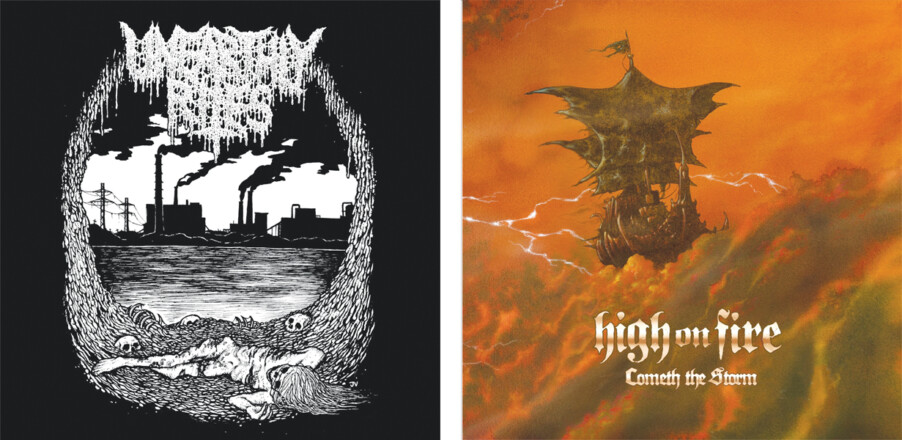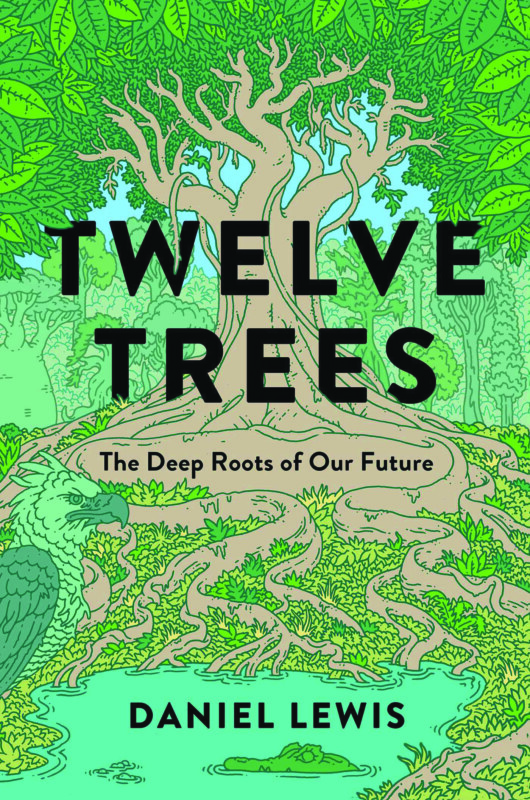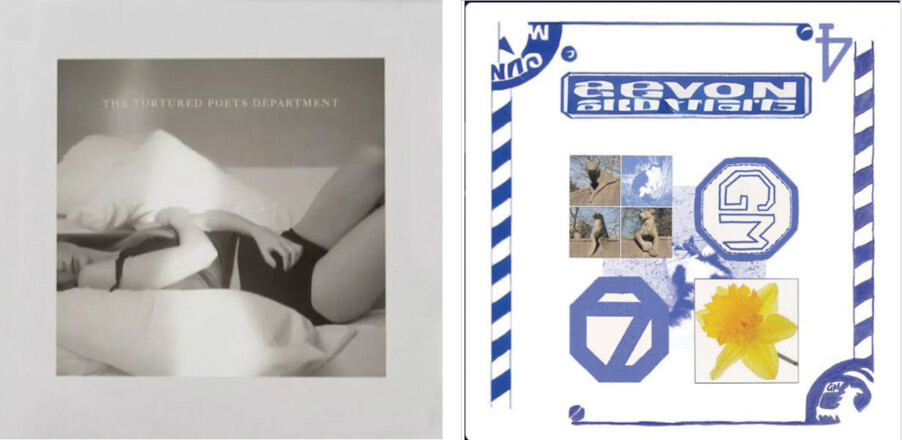Unearthly Rites, Ecdysis (Prosthetic Records)
You know, I don’t know if I’ve ever reviewed an album from the Prosthetic imprint in this space, but they’ve stuffed my emailbox for so long now that it’d be weird if I didn’t hear from them. It’s like that viral video that made the rounds a few months ago, where a little boy’s getting off the school bus and an all-black chicken comes running over to him to get hugs; Prosthetic is one of my favorite hug-seeking chickens, so let’s do this thing. If you haven’t guessed by now, we’re talking about a death metal band, one that comes to us “from the death metal caves of Finland,” and this is their first full-length. They love to brag about their DIY roots, which are verified through their really raw overall sound, which one critic didn’t like, but I do: It’s very punky, folks, just a dilapidated wall of hate atop which sits a workable-enough singer who does a fine Cookie Monster imitation. For what it is, it’s awesome. A-
High On Fire, Cometh The Storm (MNRK Heavy Records)
The mainstream rock press’s love for this mud-metal band has mystified me since the release of their first album, never you mind how long ago it was. I know some people love them some Motorhead, and I appreciate that, but that’s what ex-Sleep guitarist Matt Pike and his boys have always sounded like to me, Motorhead with a side of — well, nothing else really. By the way, they won a Best Metal Performance Grammy in 2019, the last time they could be bothered to put out an album, which speaks more to the distracted, half-informed mindset of the Grammy people than anything else, but let’s get to this one, which opens in fine fettle with “Lambsbread,” a riff clinic that sounds like Motorhead crossed with early Slayer, then the distinctly Crowbar-like grind-a-thon “Burning Down,” which does peg the coolometer. Bassist Jeff Matz (formerly with Zeke) adds some trippiness to the proceedings, specifically by playing a Turkish lute, so some of this sounds like Motorhead playing with Ravi Shankar. OK, anyway, there we are, Motorhead, um I mean High On Fire everyone. A
PLAYLIST
A seriously abridged compendium of recent and future CD releases
• Hoo-rah, look alive guys, the May 17 music-CD drop-date, and look at this, I’m already out of my element, because the first thing I have to deal with in these proceedings is a new album from Cage the Elephant, called Neon Pill! I am one of those professional music journalists who was sent the first Cage The Elephant album and thought it was boring and stupid, which led to a 20-year journey of having no friends, but it was worth it just to see the look on people’s faces. I still don’t get it, and I still don’t like this band or Portugal [curiously placed period] The Man either. But one of my associates really likes Cage The Elephant, and so for them (because I really, really care) I will heretofore forthwith proceed to put my current stomach contents at risk by listening to their new single to see if they’re still the emperor’s new clothes of skinny-jeans bands. Are y’all ready, that’d be great. OK, so I’m now reporting to you live from YouTube, guys, where I’m about to listen to the title track. Uh oh, wait, is this actually Cage The Whatever, or is it Guster? It sure sounds like Guster, talk about boring. Wait, this just in, folks, there’s some skronky noise in the mix, probably added so people would think the song’s important, but it’s better than nothing. Once again, I’m Eric Saeger, everyone, and this is “Listening To Really Pointless Music.”
• Carefully manufactured fashion-victimizer Billie Eilish is still around, being an unintelligible one-person Insane Clown Posse and doing annoying stuff like resembling my least favorite ex, and plus making albums, like her new one, Hit Me Hard And Soft! No, I don’t mind Billie Eilish, if people want to believe the record company’s story about how they found her in a Dumpster eating stale saltines or whatever the deal was, I cannot prevent them from falling for marketing ploys, but either way, let’s trudge back over to the YouTunes to see what’s going on with this ridiculous post-postmodern whatever. So, dum de dum, let’s see, here’s a tune from the new album, called “Chihiro.” She is half-whisper-singing, of course, because that’s her brand, heaven forbid she should just sing like a normal — wait, hold it guys, this is just a bunch of snippets from the song, because she knows all the 9-year-olds who listen to her would just pirate the tune through YouTubeToMP3, isn’t that clever? The song is slow, with an upbeat afterparty vibe, sort of like if Sade were a 15-year-old who smoked cigarettes and skipped school a lot. We’re just plain doomed, fam.
• There are a lot of albums for me to ignore this week, look at ’em all. There’s massively annoying ’90s person Ani DiFranco’s Unprecedented Sh!t; massively boring Canadian indie band Of Montreal with some stupid album, who cares what it’s called; and get this, guys, smirking nepo baby actress Kate Hudson is putting out an album titled Glorious, for some reason, which I only mention so you don’t accidentally buy it at Strawberries or Service Merchandise or who even knows where you’re supposed to buy albums now! Jeez Louise, everyone’s putting out an album this week, including mummified ’90s boyband New Kids on the Block, with their new one, Still Kids!
• And finally, it’s Portishead singer Beth Gibbons, with her new LP, Lives Outgrown! She of course is a trip-hop goddess, so there will probably be nothing to dislike about this. Yup, nope, “Reaching Out” has some really cool samples, a Florence Welch part, just badass stuff that you should listen to.






